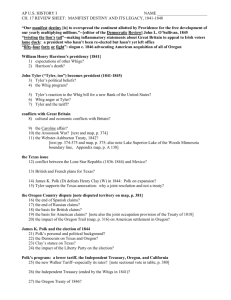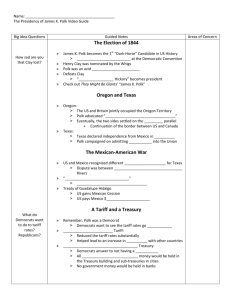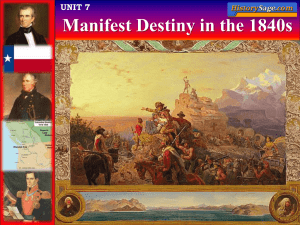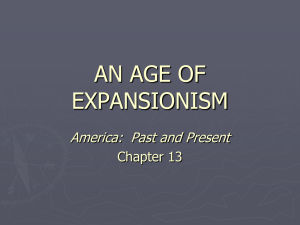Bailey PPT Ch. 17
advertisement
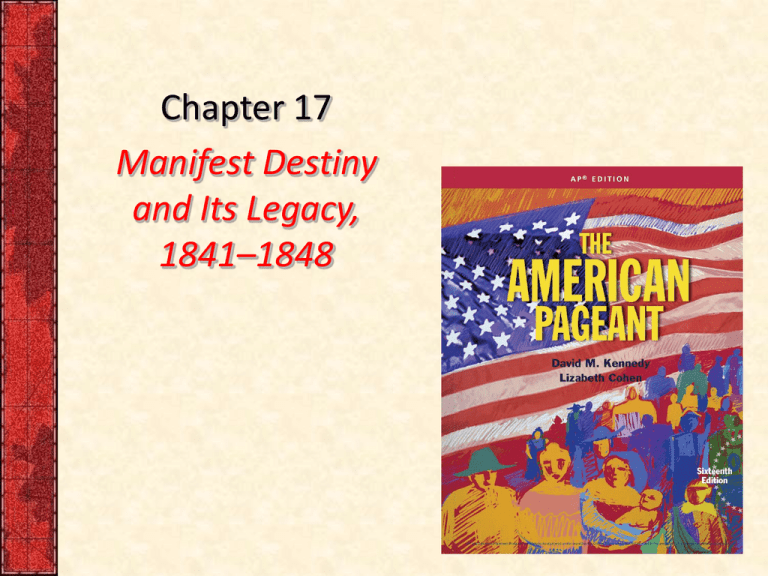
Chapter 17 Manifest Destiny and Its Legacy, 1841–1848 I. The Accession of “Tyler Too” • Whig party: – Wm. H. Harrison, a Whig, elected in 1841 and John Tyler elected Vice-President • Cabinet: Secretary of State—Daniel Webster • Henry Clay in Senate, uncrowned king of Whigs – Harrison contacted pneumonia and died after only four weeks in office: • By far shortest administration in American history but longest inaugural address I. The Accession of “Tyler Too” (cont.) • John Tyler: • “Tyler too” party of Whig ticket, now claimed spotlight • Stubbornly attached to principle • Resigned earlier from Senate, rather than accept distasteful instructions from Virginia legislature • Left Jacksonian Democrats for Whigs • Enemies accused him of being a Democrat in Whig clothing • Tyler was at odds with majority of Whigs I. The Accession of “Tyler Too” (cont.) • Whig party platform: – Pro-bank, pro-protective tariff, and pro-internal improvements. • “Tyler too” rhymed with “Tippecanoe,” but there harmony ended. • Harrison, the Whig, served for only four weeks, whereas Tyler, the ex-Democrat but largely a Democrat at heart, served for 204 weeks. II. John Tyler: A President Without a Party • Whigs platform: • Outlined a strongly nationalist program • Financial reform came first: – Whig Congress passed law ending independent treasury system – President Tyler, disarmingly agreeable, signed it – Clay drove though Congress a bill for a “Fiscal Bank” which would create a new Bank of the United States – Clay—the “Great Compromiser”—would have done well to conciliate Tyler II. John Tyler: A President Without a Party (cont.) – Tyler vetoed bill on both practical and constitutional grounds – Whig leaders tried again, passing another bill providing for a “Fiscal Corporation” – Tyler again vetoed the offensive substitute – Democrats were jubilant • Whig extremists condemned Tyler as “His Accidency” and “Executive Ass” – He was formally expelled from his party – Entire cabinet resigned, except Secretary of State Webster, then in midst of delicate negotiations with England II. John Tyler: A President Without a Party (cont.) • Proposed Whig tariff: – Tyler vetoed bill – He disagreed with Whig scheme for distributing to states revenue from sale of public lands in West – He believed this would squander federal money • Chastened Clayites redrafted tariff bill: – Removed dollar-distribution scheme – Lowered rates to moderately protective level of 1832— roughly 32% on dutiable goods – Tyler reluctantly signed Tariff of 1842 III. A War of Words with Britain • Anti-British passions: • At bottom lay bitter memories of two Anglo-American wars • Pro-British Federalists had died out • British travelers wrote negatively about American customs in travel books • Writings touched off “Third War with England” • Fortunately this British-American war fought on paper broadsides; only ink was spilled p365 III. A War of Words with Britain (cont.) – America a borrowing nation: • Expensive canals to dig and railroads to build • Britain, with overflowing coffers, was a lending nation • During panic of 1837, several states defaulted on bonds or repudiated them altogether – 1837—short-lived insurrection erupted in Canada • Hot-blooded Americans furnished military supplies or volunteered for armed service • Washington regime tried to maintain neutrality III. A War of Words with Britain (cont.) • But it could not enforce unpopular laws in face of popular opposition. • Provocative incident on Canadian frontier brought passions to boil in 1837: – American steamer, Caroline, was carrying supplies to insurgents across Niagara River – Attacked by British and set on fire – Craft sank short of falls, but one American was killed • Unlawful invasion of American soil had alarming aftermaths. III. A War of Words with Britain (cont.) – In 1840 a man, McLeod, who confessed to being involved in Caroline raid, was arrested and indicted for murder – London made clear his execution would mean war – Fortunately, McLeod freed after establishing alibi – Tensions renewed in 1841 when British officials in Bahamas offered asylum to 130 Virginian slaves who had rebelled and captured American ship Creole – Britain had abolished slavery within empire in 1833, raising southern fears that its Caribbean possessions would become Canada-like havens for escaped slaves IV. Manipulating the Maine Maps • Maine boundary dispute: – St. Lawrence River icebound several months of year: • As defensive precaution, British wanted to build a road west from seaport Halifax to Quebec • Road would go though disputed territory claimed by Maine • Aroostook War threatened to widen into full war IV. Manipulating the Maine Maps (cont.) – Britain sent to Washington a nonprofessional diplomat, Lord Ashburton, who established cordial relations with Secretary Webster • They agreed to compromise on Maine boundary (see Map 17.1) • A split-the-difference arrangement: – Americans retained 7,000 square miles of 12,000 square miles of wilderness in dispute – Britain got less land but won desired Halifax-Quebec route IV. Manipulating the Maine Maps (cont.) • Caroline affair patched up by exchange of diplomatic notes • Bonus in small print: – British, in adjusting U.S.-Canadian boundary farther West, surrendered 6,500 square miles – Area later found to contain priceless Mesabi iron ore of Minnesota V. The Lone Star of Texas Shines Alone • Texas's precarious existence: – Mexico: • refused to recognize Texas's independence • regarded Lone Star Republic as a province in revolt to be reconquered in future • Mexican officials threatened war if U.S.A. ever annexed Texas Map 17-1 p366 V. The Lone Star of Texas Shines Alone (cont.) – Threatened by Mexico, Texas maintained costly military defense – Texas also negotiated with Britain & France to secure a defensive shield of a protectorate: • In 1839 and 1840, Texans concluded treaties with France, Holland, and Belgium. – Britain & France interested in an independent Texas to help block further American expansion V. The Lone Star of Texas Shines Alone (cont.) • Other foreigners interested in Texas: – British abolitionists hoped to end slavery in Texas – British merchants regarded Texas as important free-trade area—an offset to tariff-walled United States – British manufacturers hoped Texas could produce enough cotton to reduce Britain's chronic dependence on American fiber VI. The Belated Texas Nuptials – Texas became a leading issue in 1844 presidential campaign: • Foes of expansion assailed annexation • Southern hotheads cried, “Texas or Disunion” • Pro-expansion Democrats under James K. Polk defeated Whigs • Lame duck president Tyler interpreted narrow Democratic victory as “mandate” to acquire Texas • Tyler deserves credit for shepherding Texas into fold VI. The Belated Texas Nuptials (cont.) • Despairing of securing necessary 2/3 vote in Senate for a treaty, Tyler sought annexation by joint resolution • After spirited debate, resolution passed in 1845, and Texas formally invited to become 28th state • Mexico angrily charged Americans had despoiled it of Texas • But clear by 1845 that Mexico would not be able to retake Texas VI. The Belated Texas Nuptials (cont.) – By 1845 Lone Star Republic had become a danger spot: • Invited foreign intrigue that menaced American people • Continued existence of Texas as independent nation threatened to involve United States in wars • United States can hardly be accused of haste in achieving annexation p367 VII. Oregon Fever Populates Oregon • Oregon Country: – Geography • From Rockies to Pacific Ocean, north of California to 54 40' (present southern tip of Alaska panhandle) • Claimed at one time or another by Spain, Russia, Britain, and the United States • Two claimants dropped out of competition: – Spain through Florida Treaty of 1819 – Russia retreated to 54 40' line by treaties of 1824 & 1825 VII. Oregon Fever Populates Oregon (cont.) – British claims to Oregon were strong: • Especially portion north of Columbia River • Based on: – – – – Prior discovery and exploration Treaty rights Actual occupation Colonizing agency Hudson's Bay Company – American claims to Oregon: • Exploration and occupation • Captain Robert Gray (1792) stumbled onto Columbia River, which he named after his ship VII. Oregon Fever Populates Oregon (cont.) • Famed Lewis and Clark expedition of 1804-1806 • Presence of missionaries and other settlers, some of whom reached Willamette River valley – Missionaries, in trying to save the soul of the Indians, were instrumental in saving the soil of Oregon for United States – They stimulated interest in a faraway domain that many Americans earlier assumed would not be settled for centuries • Scattered Americans and British pioneers lived peacefully side by side VII. Oregon Fever Populates Oregon (cont.) – Anglo-American Convention of 1818 (Chap. 12): • United States wanted to divide at forty-ninth parallel • British wanted Columbia River as dividing line • A scheme for peaceful “joint occupation” was adopted, pending future settlement • Handful of Americans in Willamette Valley was multiplied in early 1840s by “Oregon fever” p368 VII. Oregon Fever Populates Oregon (cont.) • Over 2,000 mile Oregon Trail (1846) five thousand Americans had settled south of Columbia River • British could only muster seven hundred north of Columbia River – Actually only a relatively small area was in dispute by 1845: – Americans proposed line @ forty-ninth parallel – British again offered line at Columbia River – Issue now tossed into presidential election of 1844, where it became overshadowed by question of annexing Texas p369 VIII. A Mandate (?) for Manifest Destiny • Two major parties nominated their standardbearers in May 1844: – Whigs selected Henry Clay – James Polk (Tennessee) chosen by Democrats— America's first “dark horse” – Campaign an expression of Manifest Destiny: • Sense of mission, believing God had “manifestly” destined U.S.A. for career of hemispheric expansion VIII. A Mandate (?) for Manifest Destiny (cont.) – Expansionist Democrats: • Strongly swayed by Manifest Destiny • Platform: “Reannexation of Texas” and “Reoccupation of Oregon” all the way to 54 40' • “All of Oregon or None” (Slogan “Fifty-four forty or fight” not coined until two years later) • Condemned Clay as “corrupt bargainer,” dissolute character, and slaveowner VIII. A Mandate (?) for Manifest Destiny (cont.) – The Whigs: • Countered with their own slogans • Spread lie that a gang of Tennessee slaves had been on way to slave market branded with initials J.K.P. (James K. Polk) • Clay “straddled” crucial issue of Texas: – While he personally favored annexing slaveholding Texas (an appeal to South), he also favored postponement (an appeal to North) p370 VIII. A Mandate (?) for Manifest Destiny (cont.) • Election results: • Polk nipped Clay 170 to 105 votes in Electoral College • 1,338,464 to 1,300,097 in popular vote • Clay would have won if he had not lost New York State by a mere 5,000 votes: – Tiny antislavery Liberty Party absorbed nearly 16,000 votes that would have gone to Clay • Democrats proclaimed they received a mandate from voters to take Texas IX. Polk the Purposeful • President James Polk: • Not an impressive figure • His workload increased by his unwillingness to delegate authority • Methodical and hard-working but not brilliant • Shrewd, narrow-minded, conscientious, persistent • Developed a four-point program, and with remarkable success achieved it completely in less than four years IX. Polk the Purposeful (cont.) • Polk's four-point program: – Lower tariff • Secretary of Treasury, Robert Walker, devised tarifffor-revenue bill that reduced average rates of Tariff of 1842 from 32% to 25% • With strong support from low-tariff southerners, Walker Tariff bill made it through Congress • Complaints came from middle states and New England (see Table 17.1) • Bill proved to be excellent revenue producer Table 17-1 p371 IX. Polk the Purposeful (cont.) – Restore independent treasury: • Unceremoniously dropped by Whigs in 1841 • Pro-bank Whigs in Congress raised storm of opposition, but Polk successful in 1846 – Third and fourth points on Polk's “must list” were acquisition of California and settlement of Oregon dispute (see Map 17.2) Map 17-2 p371 IX. Polk the Purposeful (cont.) • Settlement of Oregon dispute: • “Reoccupation” of “whole” had been promised to northern Democrats in 1844 campaign • Southern Democrats, once Texas annexed, cooled off • Polk, feeling bound by three offers of his predecessor to London, proposed line at 49. • British anti-expansionists now believed that Columbia River was not St. Lawrence of West • Britain in 1846 proposed line at 49 IX. Polk the Purposeful (cont.) • Polk threw decision to Senate • They speedily accepted offer and subsequent treaty • Satisfaction with Oregon settlement among Americans not unanimous • Polk, despite all the campaign bluster, got neither “fifty-four forty” nor a fight • He got something that in the long run was better: a reasonable compromise without a rifle raised p372 X. Misunderstandings with Mexico – Faraway California was another worry for Polk: • Diverse population: Spanish Mexicans; Indians; some “foreigners” (mostly Americans) • Given time these transplanted Americans might bring California into the Union • Polk was eager to buy from Mexico • Mexico owed United States some $3 million for damages to American citizens and their property • More serious contention was Texas • Deadlocked with Mexico over Texas's boundaries X. Misunderstandings with Mexico (cont.) • Texas wanted boundary at Rio Grande River • Mexico sought boundary at Nueces River • Polk careful to keep U.S. troops out of no-man's-land – California continued to cause Polk anxiety: • Rumors—British wanted to buy or seize California – Americans could not accept under Monroe Doctrine • Polk dispatched John Slidell to Mexico City (1845): – To offer $25 million for California and territory to east – Mexico would not even permit Slidell to present his offer XI. American Blood on American (?) Soil • Polk decided to force a showdown: – January 13, 1846, he ordered 4,000 men: • Under General Zachary Taylor to march from Nueces River to Rio Grande hoping for a clash • When nothing happened, he informed cabinet (May 9, 1846) that he proposed to declare war because of: – Unpaid claims – Slidell's rejection • News of bloodshed arrived same night • Mexican troops crossed Rio Grande and met Taylor XI. American Blood on American (?) Soil (cont.) – Polk sent vigorous war message to Congress: • Congress overwhelmingly voted for war • In message to Congress, Polk was making history— not writing a balanced account • Spot resolution—by Abraham Lincoln demanded information as to precise “spot” on American soil where American blood had been shed – Did Polk provoke war? • California was imperative in his program • Mexico would not sell it at any price XI. American Blood on American (?) Soil (cont.) • Polk wanted California, so he pushed quarrel to bloody showdown • Both sides were spoiling for a fight • Both sides were fired by moral indignation • Mexicans wanted to fight “Bullies of the North” • Many Americans sincerely believed Mexico was aggressor XII. The Mastering of Mexico • Polk wanted California—not war: – When war came, he wanted to fight on a limited scale and then pull out when he captured prize – Santa Anna convinced Polk that he would betray Mexico, but he then drove his countrymen to a desperate defense of their soil XII. The Mastering of Mexico (cont.) • American operations in Southwest & California completely successful (see Map 17.3): – Both General Stephen Kearny and Captain John Frémont had success in West – Frémont collaborated with American naval officers and local Americans who hoisted banner of shortlived California Bear Flag Republic Map 17-3 p374 XII. The Mastering of Mexico (cont.) – General Taylor defeated Mexicans in several battles and then reached Buena Vista (February 22-23, 1847): • Here his 5,000 troops repulsed attack by 20,000 troops under Santa Anna • Taylor became “Hero of Buena Vista” • Taylor, however, could not defeat Mexico decisively in semi-deserts of northern Mexico • Need a crushing blow at enemy's vitals—Mexico City XII. The Mastering of Mexico (cont.) • General Winfield Scott succeeded in battling his way to Mexico City by Sept., 1847 – One of most brilliant campaigns in U.S. history – Scott proved to be most distinguished U.S. general between American Revolution and Civil War XIII. Fighting Mexico for Peace • Scott and chief clerk of State Department Nicholas Trist arranged: – Armistice with Santa Anna (cost $10,000) – Polk ordered Trist home, but he wrote a 65-page letter explaining why he could not come home – Trist signed Treaty of Guadalupe Hidalgo on February 2, 1848, forwarded it to Washington XIII. Fighting Mexico for Peace (cont.) • Treaty of Guadalupe Hidalgo: • • • • Confirmed American title to Texas Yielded enormous area stretching to Oregon, the ocean, embracing California Total expanse was about ½ of Mexico United States agreed to pay $15 million for land and to assume claims of its citizen against Mexico (amount = $3,250,000) – (see “Makers of America: the Californios”) p376 p377 XIII. Fight Mexico for Peace (cont.) • Polk submitted treaty to Senate: – Antislavery Whigs in Congress—dubbed “Mexican Whigs” or “Conscience Whigs”— denounced “damnable war” – Another peril impended: • A swelling group of expansionists clamored for all of Mexico • If America had seized it, she would have been saddled with an expensive and vexatious policing problem XIII. Fight Mexico for Peace (cont.) • Victors rarely pay an indemnity: – Polk arranged to pay $18,250,000 after winning – Critics claimed Americans had guilty conscience – Apologists pointed proudly to “Anglo-Saxon spirit of fair play” XIV. Profit and Loss in Mexico • As wars go, Mexican War a small one: – Cost 13,000 American lives, most by disease – Fruits of war were enormous: • • • • America's total expanse was increased by 1/3 Proved to be blood-spattered schoolroom for Civil War Campaigns provided priceless experience for army Navy valuable in blockading Mexican ports XIV. Profit and Loss in Mexico (cont.) • Marine Corps won new laurels and to this day sings in its stirring hymn about the “Halls of Montezuma” • Army waged war without defeat and without a major blunder • Opposing armies emerged with increased respect for each other • Mexicans never forgot that U.S.A. tore away about ½ of their country • Marked an ugly turning point in relations between United States and Latin America XIV. Profit and Loss in Mexico (cont.) • War aroused slavery debate that not stop until Civil War • David Wilmot of Pennsylvania introduced amendment that slavery should never exist in any territories wrested from Mexico • Wilmot Proviso never became law, but: – Endorsed by legislatures of all but one of free states – Came to symbolize burning issue of slavery in territories • More than any other issue, debate over slavery in new western lands divided North & South • From perspective of history, opening shots of Mexican War were opening shots of Civil War p378 p379 Map 17-4 p379 p380
